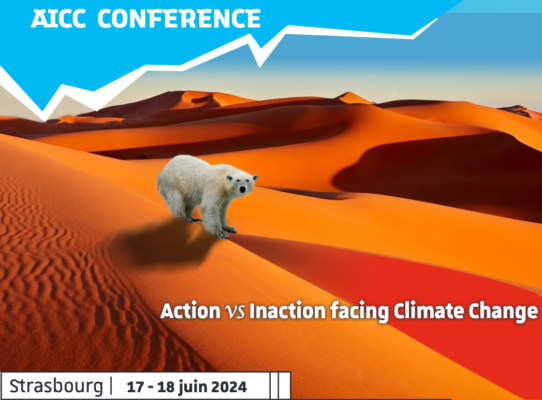The AICC2 Conference Brings Together 150 Participants from Diverse Backgrounds to Address Climate Change
25 June 2024

Strasbourg, June 21, 2024 – The second international AICC (Action versus Inaction facing Climate Change) conference was held on June 17 and 18 in Strasbourg, bringing together nearly 150 participants from various backgrounds to discuss the critical issue of climate change.
Alongside renowned scientists and experts, the event welcomed around fifty students, local government representatives, and members of civil society, emphasizing the importance of an inclusive approach to addressing environmental challenges.
Organized by several research structures from the University of Strasbourg (BETA, SAGE, LIVE, UNESCO Chair on Journalistic and Media Practices) in partnership with CY Cergy Paris University and supported by the Eurometropolis of Strasbourg, ITI MAKErS, the Federation of Research in Environment and Sustainability (FERED), and the RENEL Chair, this flagship conference facilitated rich and interdisciplinary exchanges on environmental, economic, and societal issues related to the climate crisis.
A Rich Program and Encouraging Perspectives
The first day, warmly and professionally hosted at the European Parliament, began with high-level plenary presentations1 followed by a roundtable discussion2, gathering international speakers. The discussions covered crucial topics such as climate policies, the impacts of climate change on ecosystems, and the necessary energy and ecological transitions. The issue of climate change was addressed at local, French, European, and North-South levels.
The second day, held at the Faculty of Economics and Management, focused on thematic parallel sessions covering areas such as green economy, sustainable finance, resilient cities, and eco-responsible behaviors.
A Platform for Interdisciplinary Exchanges
“The presence of students, local representatives, and civil society actors greatly enriched the debates. Participants appreciated the friendly and efficient involvement of the volunteer students,” highlighted the president of the organizing committee, Professor Nathalie Picard. She also emphasized “the commitment of all members of the organizing committee, students, researchers, and teachers from the Faculty, as well as from the Louis Pasteur and Robert Schuman IUTs.”
Participants were able to establish valuable contacts and lay the groundwork for future interdisciplinary and cross-sector collaborations, essential to tackling the complex challenges posed by the global environmental crisis, as noted by the vice-president of the organizing committee, Asmae Aqzzouz: “This conference opens up perspectives that allow us to address climate change from all angles, integrating the concerns of various audiences.” Another vice-president of the committee, Jérémy Picot, added: “Hopefully, this will also reignite interest in these issues in public debate, and the university is here to contribute to that.”
A groupe LinkedIn, a website (https://aicc.science/), and a dedicated YouTube channel (@AICC-Academia) will allow for continued discussions and sharing of resources from the conference. In conclusion, Professor André de Palma, initiator of the AICC consortium, “invites you to the next AICC3 edition, which is already scheduled to take place in Lausanne in June 2025.”
Photographs and Visuals: (©J. Picot for photographs, ©J-M Gachon pour les visuals)
https://seafile.unistra.fr/d/d5ba3ad13cdd4ae3a5fc/
Program: https://aicc2.sciencesconf.org/
1 The plenary presentations were delivered by teaching-researchers from Canada (University of British Columbia), the United States (Massachusetts Institute of Technology), Switzerland (École Polytechnique Fédérale de Lausanne), Belgium (KUL), and France (Paris School of Economics, Sorbonne, and CIRED responsible for IPCC reports).
2 The roundtable discussion brought together French and German companies around the topic of retrofitting (transforming a thermal car into an electric car).






